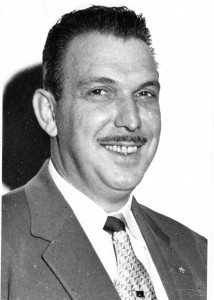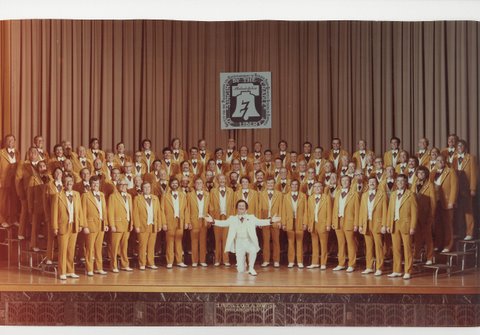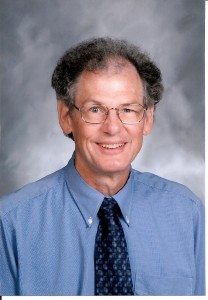Ten Directors Since 1942
There have been 10 directors of the chorus since its beginning. In order, they have been:
- John Hanson (1942-53)
- Floyd Connett (1953-7)
- Glenn Perdue (1957-71)
- Samuel L. Anliker (1971-77)
- Dean Ramga (1977-79)
- Byron W. Blair (1979-82)
- James A. Stahly (1982-90)
- James A. Stahly and Byron W. Blair (1991-93)
- George Peters (1994)
- Byron W. Blair (1994-95)
- Dennis Morrissey (1995-2002)
- Terry Ludwig (2002-present)
- Tim Beutel (2019-present)
John Hanson
Born: June 24, 1895, in Peoria, IL
Died: July 17, 1954, in Bloomington
Burial: Park Hill Cemetery, Bloomington.
Chorus Director: 1942-1953
John Hanson was first director of Bloomington Chapter No. 1 from its inception in April 1942 until 1953.
A graduate of Peoria Manual Training High School, John was a former semi-pro baseball player and an early associate of radio’s Fibber McGee (Jim Jordan) in vaudeville. John was instrumental in spreading barber shop singing in Central Illinois from his home in Peoria. At age 39, he was asked to help put on a minstrel show at a Peoria high school and he asked friends from communities around Peoria to participate. About 40 responded and produced a very respectable show of quartets, soloists and a chorus.
The men decided to stay together and formed the Klose Harmony Klub. In 1941, after learning about the Society for the Preservation and Encouragement of Barber Shop Quartet Singing in America, Inc. (SPEBSQSA), the group organized as the Peoria Chapter with 54 members.
In April 1942, Bloomington organized its chapter and named John Hanson its director.
As many as 10 communities were led by John in the Forties, and he taught them all the same songs by rote. These communities joined for performances as the Corn Belt Chorus. When a Corn Belt Chorus chapter put on a show, the entire chorus was invited. A May 6, 1946, photo in the Peoria Journal Star chronicled a 325-man chorus singing at the Peoria show.
In 1941, John sang bass with the Capitol City Four of Springfield when they placed fifth in the national contest. He sang bass for several years with the Gipps-Amberlin Four of Peoria, placing fourth in the 1944 national contest and literally stopping the show with its rendition of “Shine.”
John was an international board member 1942-43 and was the Society’s first designated Master of Ceremonies for national conventions.
He lived in Bloomington his final five years. His late daughter, Betty Hanson Oliver, sang tenor with the international champion Sweet Adelines quartet The Pitch Pipers.
Floyd Connett
Born: April 3, 1915, in Peoria.
Died: Sept. 21, 1963, in Peoria.
Burial: Park View Cemetery, Peoria.
Chorus Director: 1953-1957
Floyd Connett became Bloomington’s second director in 1953.
A real-life barber in Peoria, Floyd took up the profession after attending Peoria Barber College and marrying Maxine Talbot in 1937. They had a daughter, Linda (Keutzer), and a son, Steve, and the family often sang together. “Any one of the Connett Quartet sings any part, except me,” said Floyd in his barber shop resume. “The kids says, ‘You just haven’t got it, Dad!’”
In 1953, Floyd had been directing the Peoria Belles Sweet Adelines chorus for five years. In just three years, he took the Bloomington chorus to the state title, which qualified the Kountry Kernels (the name adopted in 1956) for the international competition in Los Angeles in 1957. Connett and the chorus, dressed in bib overalls, straw hats, red bandanas and work boots, placed third, its highest finish ever.
At the contest, Floyd’s prowess (he was certified judge in all five contest categories) made him a popular coach for many quartets who sought his help. It also was a showcase for Floyd, who was hired that same year to be the Society’s first field representative. He traveled the country by car, visiting chapters and teaching the craft of blending and harmonizing with thousands of members. In 1961, he left that job to become national educational director of Sweet Adelines.
Floyd was an accomplished arranger, with many of his works still among those published by the Society. Most of the songs performed by Bloomington in the Fifties and early Sixties were Connett arrangements. He coached many quartets on their way to winning gold medals, and he also worked with The Buffalo Bills as the quartet prepared for its role in Meredith Willson’s The Music Man on Broadway.
Introduced to the barber shop chord by John Hanson, Bloomington’s first director, Floyd acknowledged how thankful he was to have served his apprenticeship under John. A Hanson arrangement of My Hometown, updated by Floyd, became a successful contest tune for the Kountry Kernels.
The Tuesday prior to the 1963 state convention, Floyd was coaching the Bloomington chorus (directed by his protégé, Glenn Perdue) as it prepared for the competition the coming weekend. It was the following Saturday, Sept. 21, while pulling weeds at his barber shop property, he succumbed to a heart attack at age 48.
On that Tuesday, Floyd was reminiscing with Charlie Driver and Harold Coffman about his first night as Bloomington director. He recalls that he came over “to really show the boys his stuff.” He taught the chorus a song by rote by 9 p.m. and was ready to add the tag. But President Coffman interrupted and said it was time for a break. Floyd protested but Harold insisted. All through the business meeting, Connett said he was fuming. “Who’s this guy Coffman who thinks he can tell me what to do?” he muttered to himself. He grew more perturbed when a couple of quartets sang. About 9:30, Harold turned to Floyd and said: “Now it’s all yours. How about teaching us that tag?”
Connett taught the tag, then led the entire song which went without a hitch. The 40 guys spontaneously jumped to their feet and gave the blushing Connett a sincere, prolonged ovation. According to Floyd, he felt about 10 inches tall. It was the first time, he said, he understood a chorus should be run by the members and the director should concentrate on directing.
This anecdote about separation of powers – this distinction between chapter and chorus – became a theme of his comments to chapters during his time as Society field representative.
Glenn Perdue
Born: April 21, 1925 at Peoria, IL
Chorus Director: 1957-1971
Glenn Perdue became Bloomington’s third director in 1957, when his mentor, Floyd Connett, left to become the Society’s first field man. Glenn sang baritone in the Kountry Kernels in 1957 and was Floyd’s assistant director. Glenn also directed the Peoria Chapter 18 years, many times leading both groups in the same competition.
Glenn comes from a musical family, which moved to Abingdon soon after he was born and returned when he was eight. At five, Glenn and his brother Bob, 3, would go with their father as he played piano at clubs. After playing Maple Leaf Rag, for example, Glenn says his father would have the two boys sing a couple of songs. “Then Bob and I would pass the hat. We collected and they (Dad and the banjo player) made the money!” The boys also sang on radio.
Guy (Glenn’s father) learned to play by putting his fingers on the keys while a player piano operated. Glenn was the only brother who had lessons. Youngest brother Don played by ear. The Perdues sang in a family quartet back in the Fifties.
After graduating from Peoria Woodruff High School in 1939 where he excelled in all sports, Glenn served in W.W. II on the Intrepid (he attended a ship reunion in Boston in 2009). Glenn returned to Peoria and married Mary Lou on Jan. 1, 1945. Following his father’s profession, Glenn became a piano tuner. The Perdues have a son, three daughters, 10 grandchildren and 2 great-grandchildren.
Glenn joined the Society in 1951 in Peoria. He became Bloomington’s assistant director in 1953 under Floyd Connett and took the reins in 1957. Glenn sang baritone under Floyd’s direction when the chorus won 3rd place in 1957; Floyd sang baritone with the chorus under Glenn’s direction when the chorus won 4th place in 1960. As fate would have it, Glenn’s appendix required removal about a month before the contest. Rather than forego the chance to direct, he lay prone in the back of Connett’s station wagon for the drive to Texas.
In Peoria, Glenn found himself filling in occasionally for John Hanson, first director of Bloomington and Peoria. As did Hanson and Connett before him, Glenn taught his singers by rote. That meant he had to have all four parts committed to memory. Glenn took Peoria to international competition in 1977, when the 7th. During his career, he has also directed choruses in Springfield (men’s and women’s 5 years), Decatur (men 9 years), Farmington (2 years), Bloomington (women 2 years) and Peoria (women 6 years).
Quartets have always been a part of Glenn’s barber shop life. He sang baritone with the Heart of Illinois Four, a top-20 finisher in the 1957 international competition in 1957. His brother Bob sang lead. The Midwesternaires organized in 1961 with Glenn on lead. Placing as high as 3rd in Illinois, the quartet continues to sing most every month for its own pleasure. Glenn sings baritone and lead.
In his 80s, Glenn still plays golf every week. He won the Peoria Seniors Men’s City championship in 1997 and 1989.

Sam Anliker
Born: 1939
Musical Director: 1971-77
Sam Anliker came to the Bloomington Chapter soon after joining Bloomington High School as head of the choral music program. Born in Bloomington, Sam grew up in Eureka and enrolled at Illinois Wesleyan University where he earned his bachelor’s degree in music in 1961 and his master’s in choral conducting in 1966. At Wesleyan, Sam was four-year accompanist for The Apollo Quartet, which appeared several times on Bloomington shows in the early Sixties. Sam was choral director in Roanoke-Benson before assuming Bloomington High’s choral position in 1971.
That’s when he was recruited by Jim Stahly (who sang in The Apollo Quartet) as Bloomington Chapter’s chorus director. Sam attended three Harmony College sessions and recalls working with Mac Huff and Dave Stephens. “That is where real learning came from,” according to Sam. “My master’s degree should have included those Harmony College classes! They were the best!”
After taking the reins of the chorus in 1971, Sam saw the potential of a high school barber shop program increasing male participation in his other choirs. “We were one of the very first high schools to institute the Young Men In Harmony program,” Sam recalls. After just two years, Sam had a group of 36 freshmen boys striving to become one of the 30 varsity barber shop singers. His success was the subject of a page of pictures and an article in the Society’s The Harmonizer (July-August 1973).
Sam’s BHS Barbershoppers performed at many school and community programs, including the Bloomington Chapter’s annual shows. Other performances were at Chicago’s Palmer House Hotel, on a southern trip for President Carter, and at the Society’s Kenosha headquarters where an impromptu performance for Music Director Bob Johnson and other staffers planted the seed for the Society’s Young Men In Harmony program. The Kenosha performance led to Sam’s high school boys performing for aNational Music Educator’s Conference in Chicago, where the high school presented Bob with a plaque to thank him for his idea of beginning the YMIH (now Youth In Harmony) Program.
“I remember my first rehearsal,” Sam says. “I was a real choral director ‘out of water’ because I was used to a music stand to put my music on and look at while I directed the chorus. These (Bloomington Chapter) guys must have gasped!” But Sam’s personality and drive led to the chorus winning the state title in 1976, its first since 1959. That qualified The Sound of Illinois Chorus to compete in Philadelphia in 1977 where it placed 10th out of 16 choruses with 85 men on stage.
That fall, Sam left Bloomington and teaching to take a sales position, eventually relocating to North Carolina where he became an executive recruiter in 1993. He and his wife Joyce live in Indian Land, S.C., where Sam runs his own executive search service for the financial services sector. Their son Brad and Daughter Carolyn are married and have two children each.
More than a few of Sam’s former students are barbershoppers, including several in The Sound of Illinois and others around the country. Former BHS singer Dwayne Cooper is Society treasurer and past president of the Southwestern District.
Dean Ramga
Born: Aug. 28, 1946, Columbus, Ohio
Died: Sept. 24, 2011, Fishers, Ind.
Chorus Director: 1977-79
Dean came to Bloomington in 1974 as a State Farm transfer from Newark, Ohio, where he had joined the Society in 1971, singing with the Land of Legend Chorus and The Chord Machine quartet. He became active in the music leadership of the Bloomington Chapter immediately as a lead and section leader.
After serving as assistant director, Dean took over the directorship in 1977 until he left Bloomington for Fishers, Ind., in 1979, where he sang with the Southern Gateway Chorus in Cincinnati, Ohio. Probably his most memorable show as director was the 1979 tribute to The Music Man, in which Dean led the chorus and portrayed Professor Harold Hill. He soloed on Trouble in front of the chorus.
Dean sang lead in the 1977 Illinois district champion quartet, The Candidates. Other members (from other chapters) include: Steve Burkhardt, tenor; Tim McEvilly, baritone; and Ed Chapman, bass.
In Dayton, Dean also sang with the Dayton Philharmonic Chorus and the Dayton Bach Society. In 1989, he helped form Musica!, a semi-professional choral ensemble.
Dean died Sept. 24, 2011, at his home. Surviving are his wife, Vicki, and four children and one granddaughter. Dean was vice president for finance at Christian Theological Seminary, Indianapolis, at the time of his death.

Byron Blair
Born: 1948, Paris, Ill.
Musical Director: 1979-1994
Byron joined the Sound of Illinois Chorus in 1974 and became assistant director in 1978. He was appointed the group’s sixth director in 1979 until 1991, then was co-director (with Jim Stahly) from 1991 until 1993 when he again assumed the lead role for two years (until 1994). He has been a member of the music team for most of his membership as section leader, assistant director, director, and/or music vice president. He sings baritone in the chorus.
A graduate of Illinois Wesleyan University where he earned his bachelor of music education degree in 1970, Byron was choral instructor for the Tri-Valley school system from 1970-77. He joined State Farm in 1977 where he is in the systems department.
Byron’s musical talent was cultivated beginning at six years old when he started piano lessons. He added the baritone horn in fourth grade and organ in seventh grade. While in high school, he was pianist in a five-piece dance band and organist at two churches.
While at Wesleyan, Byron was lured to the pit band by Chaunce Conklin’s Barn Theatre in Goodfield where he played piano for many years. He is the substitute organist for First Presbyterian Church in Normal.
Byron has been an active quartet singer during his years with the SOI. During the last half of the Seventies, he sang lead withNotoriety Society. He sings baritone with Harmony Guaranteed which formed in 1991. Byron was Illinois’ Central Division Barbershopper of the Year in 2007, recognizing his contributions to the Bloomington Chapter and Illinois District.
Byron and his wife Diana have two sons and one grandchild.

Jim Stahly
Born: May 10, 1940
Musical Director: 1982-1993
Jim has been a Society member since 1957, all in the Bloomington Chapter (since 2005, he also is a member of the Naples, FL, Paradise Coastmen chorus). He arranged music for the chorus repertoire from 1965 to 1985, was assistant director under Glenn Perdue 1970-71, and became director in 1982. In 1990, he and Byron Blair shared duties for three years.
Chapter president in 1967, Jim has sung for every Bloomington chorus director except John Hanson, the first. He was a Society arrangement judge (1982-89), district marketing & PR vice president (1997-99),
Jim sang tenor in the 1970 Illinois champion quartet, The Ideals (1966-72; 1990-94), and was its arranger. Other quartets include The Apollo Quartet (IWU group that toured the South Pacific for 2 months in 1962 to entertain U.S. troops), The Happy Timers (1963-65), The Harmonic Plague (1981-85), Sound Design (1985-86), The Formerlies(2006), Fifth Avenue (2008). He was tenor in all groups except Harmonic Plague and Fifth Avenue (a Naples quartet), in which he sang lead, and Formerlies (baritone).
The Bloomington chorus has appeared in international competition five times, and Jim has sung in all but the first (1957 in Los Angeles, where the chorus placed third). He was in the audience to witness that performance (his father sang bass). Jim also performed with The Ideals at the 1972 international competition in Atlanta, Ga.
Jim was Central Division Barbershopper of the Year (BOTY) in 1987 and has emceed district contest sessions. His music background includes 8 years of piano, 4 years as tenor in Illinois Wesleyan University’s Collegiate Choir and 4 years as tenor in IWU’s Apollo Quartet.
You will find Jim in the baritone section of the Sound of Illinois or the lead section of The Paradise Coastmen (winter months). Jim is married to Kathy. He has a son, Jim Jr. Kathy has a daughter Tammy, who has two children, and a son Ryan Goode.

George Peters
Born:April 19, 1931
Died: Aug. 21, 1999
George Peters served the shortest term of any Bloomington chorus director, filling the position during 1994. As a nearby Interpretation judge, he had been a frequent coach of the chorus and agreed to takethe position upon his retirement from his job at ComEd in Naperville in 1992 after 43 years.
George joined the Society in 1961.He was a member of Southwest Suburban chapter and sang bass with the Rhythm Roguesand Treble Tones while there. He moved to Naperville and was hired as director of Chorus of DuPage. Chords Unlimitedformed with George on bass, winning the state title in 1969.During their 12 years together, they sang nearly 500 shows. At one point, George was directing 3 chapters (Dupage, Town and Country and Elgin) while performing 40 shows a years with Chords Unlimited.
In 1987, he helped form Chordiac Arrest.The comedy quartet performed hilarious parodies written by Baritone Lynn Hauldren and arranged by George.They won 9th in international competition first time out, then won the 1987 Illinois quartet title. Then followed with two 5th-place medals at internationals.
George was a charter member and bass section leader of The New Tradition chorus in Northbrook(international champions in 2001). He became an interpretation judge in 1975,then qualified as a musicjudge when the system redesigned the judging categories. He also taught at Society and District colleges.
Named second recipient of the Music Man Award (1993) by the Quartet Champions Association of Illinois, George was selected as Barbershopper of the Year (BOTY) in the Illinois District in 1985, George’s widow, Geri, survives, along with a daughter, Janet Sheridan, and a son George Steven (who goes by the name Gregg).
Dennis Morrissey
Born: 1946, Little Rock, Arkansas
Musical Director: 1995-2001
Dennis joined the Bloomington Chapter twice! The first time was in 1973-74 as the newly-minted director of a nearby barbershop chorus. Joining Bloomington was an opportunity “to learn how the big boys do it”by singing for a very talented director, Sam Anliker, in a bigger chorus. Dennis says: “My favorite memory of those days was being featured in an annual chapter show playing piano onstage as the chorus sang and danced to (There‘ll Be) No New Tunes on That Old Piano. Boy, I felt like I had arrived!”
Two decades later Dennis returned to the Bloomington Chapter as its music director. “I fondly recall a lot of good fellowship, those rehearsals when the chords really rang, the excitement of the chapter shows and competitions, directing the national anthem at Wrigley Field, and our performance at the 1999 All-State Conference of the Illinois Music Educators Association (IMEA).”
Dennis joined the Society in 1971 and remained a member for thirty-five years. He directed both men’s and women’s barbershop choruses in Pontiac as well as a women’s chorus in Peoria. The Pontiac choruses earned three best small chorus
recognitions in barbershop competitions.
From 1985 through 1988 Dennis sang bass with the West Towns Chorus from Lombard, Illinois, where he served as a section leader and an assistant director. Under the direction of Dr. Greg Lyne, West Towns won the gold medal in 1987 to become the Society’s International Chorus Champion.
Beginning in the late ‘90s, Dennis served as the vice-president for chorus director development in the Illinois District, as a music and performance instructor for the Society’s COTS program, and as a member of the music faculty for IDAH (Illinois District), Harmony College East (Mid-Atlantic District), and Directors College/Harmony College.
“I’m fortunate that both my mom and dad were musicians,” says Dennis. “Thanks to my dad, I learned to play baritone ukelele and also piano in a chord-based fashion and to understand how chords progress. These experiences were fun and enjoyable, and prepared me to appreciate the beauty of barbershop-style harmonies, especially when they are sung with friends.”
His formal education includes a liberal studies degree from the University of Notre Dame, a bachelors in music and a master’s in conducting from Illinois State University, and a doctorate in music education from the University of Illinois at Urbana-Champaign.
A public school music educator, Dennis teaches junior high and high school choral music in Bloomington District 87. He and Marcia, his wife, have two (step-) children and one grandchild.





















